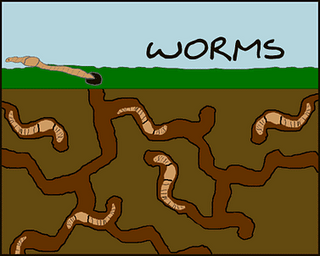
As a sideline to Dewey's naturalistic aesthetics (where, as he says, human artistic abilities are "prefigured in nature"), we considered briefly -- and somewhat comically -- in "Art and Philosophy" today the sense of claiming that humans are "greater than worms in every conceivable respect." I offered the suggestion that we replace the italicized phrase with the more descriptive "humans and worms (or any nonhuman animal for that matter) differ with respect to their capacities for x." For example, we could note that individual worms are greater soil turners and fertilizers than individual persons, so long as we disallow technological extensions of the latter's "natural" abilities. In addition, there are many things worms/humans can do (slither through keyholes/play the piano) that humans/worms cannot do.
Several students thought that my reparsing of the more simple "greater than" claim unfairly removed technology from the human's bag of natural ticks, on the reasonable assumption that employing various capacity-enhancing technologies is "not an unnatural" human capacity.
Though not unnatural, (advanced) human technology is mostly a social product rather than a manifest capacity of individual humans. And technology is unlikely to make us better keyhole slitherers. The absurdity of these comparisons is a product, I think, of tacitly comparing (in the original claim that "humans are greater in every respect to worms") both the physical and cognitive features of two different species. To say that worms are better keyhole slitherers is simply a convoluted way of saying that worms are better worms than humans could ever hope to be. Likewise, the claim that "humans are greater in every respect to worms" is a misleading way of observing that humans are better humans than worms could ever hope to be.
Comments always welcome.
DKJ
No comments:
Post a Comment